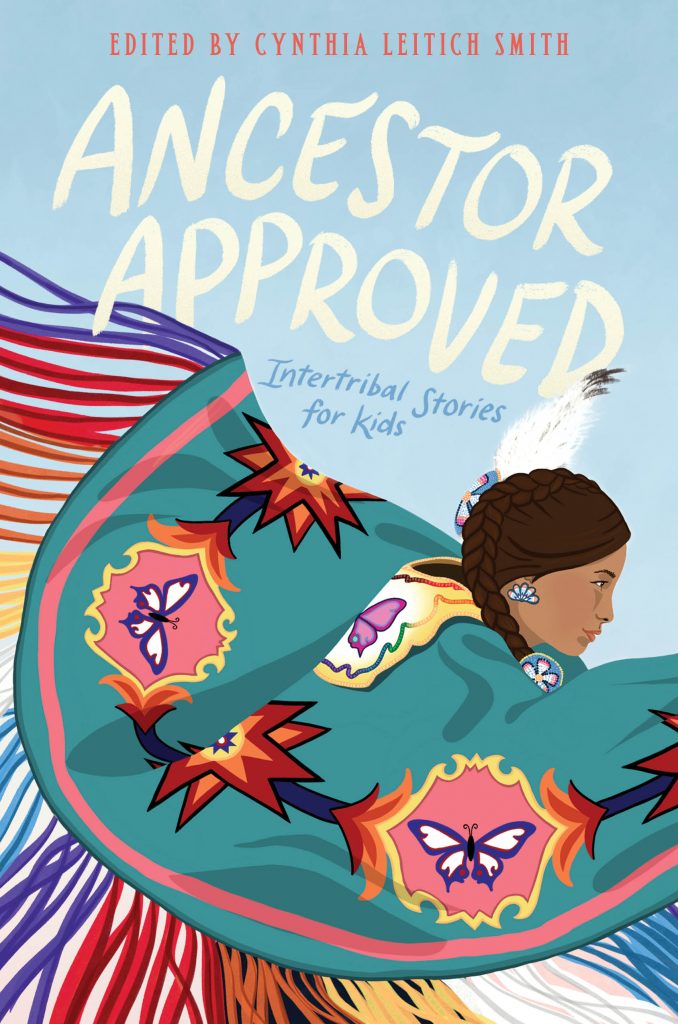
1. Bibliography
Smith, Cynthia Leitich (Ed.). 2021. Ancestor Approved: Intertribal Stories for Kids. New York: Heartdrum. ISBN 9780062869944
2. Plot Summary
In this middle grade anthology edited by Cynthia Leitich Smith, fifteen Native authors write short stories and poetry about protagonists attending the Dance for Mother Earth Pow-wow in Ann Arbor, Michigan—an intertribal event celebrating Native Americans from across the continent. Whether the characters are dancing, selling artisan products, storytelling, or even learning more about their Native heritage for the first time, the themes of belonging, healing, and celebrating heritage take center stage. Authors represent the Nations of Nulhegan Abenaki, Cherokee, Upper Skagit, Onondaga, Anishinaabe, Métis, Diné (Navajo), Ojibwe, Ohkay Owingeh, Cree, Wichita, Muscogee Creek, Cree, Choctaw, Apache, and Chickasaw. The back of the book includes a glossary and pronunciation guide, notes/acknowledgements about each short story, short introductions to all contributors, and a letter of gratitude to the readers.
3. Critical Analysis
Ancestors Approved makes it abundantly clear that Native Americans are not a monolith. Characters have a diversity of interests and talents: Mel (Muscogee Creek/Odawa) is an avid reader, Ray (Cherokee/Seminole) is a budding artist, Rory (Cree) is a fancy dancer, Tokala (Chiricahua/Anishinaabe) is an amateur detective, and Kevin (Navajo) is a basketball player. Characters have diverse living situations. Some characters, like Dalton (Tuscarora), live on “the Rez,” while others, like Aiden (Cree), do not. Characters come from different backgrounds. Some characters, like Alan (Seneca/Navajo), are of mixed Native ancestry while others, like Luksi (Choctaw), are not. Characters experience diverse problems. Maggie Wilson (Cherokee) is dealing with the death of her father, Marino (Ohkay Owingeh) is trying to raise money to save his grandmother’s house, and Jessie (Wichita) is trying to keep it together despite the fact that her mother’s been deployed to the Middle East. Characters are distinct.
Still, while the anthology celebrates the diversity of the Native American experience, it also emphasizes their unity. The themes of belonging, healing, and celebrating one’s heritage crop up in story after story, emphasizing the similarities that the Native characters share. Refreshingly, the emphasis of the stories isn’t on winning dance competitions or artisan lotteries or storytelling notoriety. The focus of each story is on “winning” something much more profound, whether it’s the trust of a brother, the money to help a grandmother pay her house expenses, the pride in one’s heritage, or the perspective to see someone more compassionately.
The anthology also calls out Native American stereotypes in its many forms. In Tim Tingle’s story, “Warriors of Forgiveness,” the Choctaw elders provide a foil for the so-called Native American “warrior” stereotype. While the elders could choose to prosecute the young man who has stolen Mrs. Simmons’s credit card as “warriors of battle,” they choose to perverse human values as “warriors of forgiveness” instead. In Eric Gansworth’s “Indian Price,” Dalton points out racism against Native Americans in the Boy Scout’s Order of the Arrow Ceremony and refuses to be the “typical Indian” that one stereotyping teenager calls him. In Erika T. Wurth’s “Little Fox and the Case of the Missing Regalia,” Tokala and Shana’s teen slang invite readers to see Native Americans not as “relics of the past” but as real people living today.
As is the case in all anthologies, Ancestors Approved is written in a variety of styles and voices, some more appealing than others. Standouts included Tim Tingle’s “Warriors of Forgiveness”; David A. Robertson’s “Brothers”; Eric Gansworth’s “Indian Price”; Brian Young’s “Senecavajo” and “Squash Blossom Bracelet”; Dawn Quigley’s “Joey Reads the Sky”; Joseph Bruchac’s “Bad Dog”; and Cynthia Leitich Smith’s “Between the Lines.” Still, every story was surprisingly well written. There were no fillers. Readers, Native and non-Native alike, are in for a treat. This book is recommended for all middle grade collections.
4. Rewards and Review Excerpts
Junior Library Guild Gold Standard Selection
Horn Book Summer 2021 Middle School Selection
New York Public Library Summer 2021 Books for Kids Selection
CCBC Book of the Week (March 2021)
Amazon.com Editors’ Picks: Best Books Ages 9 – 12
Well-Read Native Youth Book of the Week
Dignity and Justice for All: Stories of Protest, Resistance, and Change: An Annotated Bibliography of New and Noteworthy Books for Young Readers, Published 2018 – 2021 from the John F. Kennedy Presidential Library and Museum
From AudioFile: “Sixteen Indigenous authors weave together diverse stories in celebration of coming together as a community while also highlighting the young protagonists’ many different personalities and experiences. . . . All will find much to love in this collection full of heart.”
From Kirkus: “A groundbreaking Indigenous anthology for young people. Readers can join the fun in this collection of 18 contemporary stories and poems about loving families from various parts of the U.S. and Canada who travel to meet, dance, sing, socialize, and honor Native traditions at an intertribal powwow. . . . A joyful invitation to celebrate the circle of ancestors together.”
5. Connections
Use this link (https://land.codeforanchorage.org/) to input the library’s zip code and show middle graders the Native nations whose land they are living on. Then find out more about those Nations by visiting the Nations’ official websites and checking out relevant library materials.
As part of a book club, ask middle graders to name their favorite Ancestors Approved stories. Invite them to discuss together the reasons why they liked the particular stories. Then have a “book show,” inviting middle graders to peruse other titles written by each of the book’s 16 authors.
*Note—This book review was created as an assignment for a course at Texas Woman’s University.